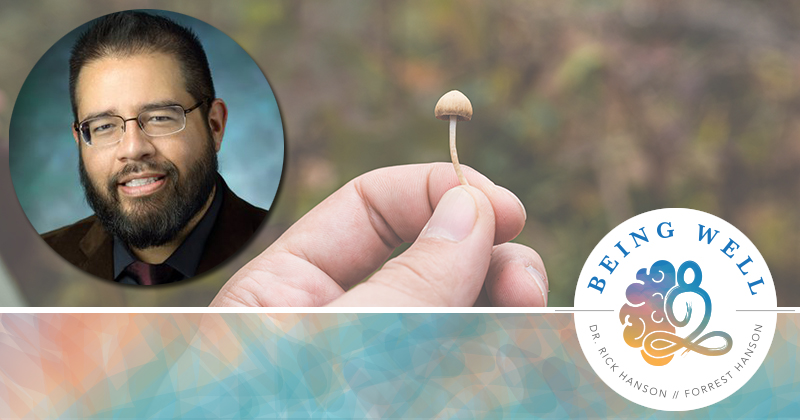01 Aug Being Well Podcast: Psychedelic-Assisted Therapy with Dr. Albert Garcia-Romeu

There’s been an explosion of interest in psychedelics over the last 10 years, and phrases like “psychedelic-assisted therapy” have gone from the relative fringes of the mental health conversation to bursting into the mainstream. Alongside a great deal of hype is a growing body of research revealing the potential of substances like psilocybin and MDMA as novel treatments for depression, addiction, and PTSD.
LISTEN
On today’s episode of Being Well, Forrest is joined by Dr. Albert Garcia-Romeu from the Johns Hopkins Center for Psychedelic and Consciousness Research. They explore the history and current state of psychedelic research, their subjective effects, the necessity of the “trip,” how psychedelics work in the brain, why researchers are so interested in these substances, and what a psychedelic-assisted therapy session looks like.
WATCH
About Our Guest
Dr. Garcia-Romeu is a member of the Psychiatry and Behavioral Sciences faculty at the Johns Hopkins University School of Medicine. His research examines the effects of psychedelics in humans, with a focus on psilocybin as an aid in the treatment of addiction.
Key Topics:
0:00: Introduction to Psychadelic-Assisted Therapy
1:55: Dr. Garcia-Romeu’s background
3:00: What psychadelic substances have been the focus of research?
8:10: The history of psychedelics
11:15: Usefulness and subjective effects of classical psychedelics (LSD/Psilocybin)
17:35: Ego loss or “ego-death” and the role of spirituality in mental health
21:40: What is happening neurologically with Psilocybin?
27:55: Psychedelics may be the best current treatment option for some conditions
35:05: How close is the research to proving efficacy?
38:05: The relative safety of psychedelics
41:00: What does a psychedelic-assisted therapy session look like?
47:00: Self-guidance in a session
49:50: Duration of treatment, financial and legal access
54:00: Using psychedelics for personal growth, spiritual practice, and even recreation
58:00: Where is the field going?
59:25: Recap
Support the Podcast
We’re now on Patreon! If you’d like to support the Being Well podcast, follow this link.
Grief and Loss Workshop: We all face losses in life, from separation and disappointment to shocking, even traumatic events. Join me August 13 and 14 for 7 hours of LIVE, online teaching focused on learning simple, powerful practices that help us come to terms with loss, heal, and find happiness again. Use coupon code BEINGWELL25 at checkout for an additional 25% off the registration price.
Sponsors:
Bombas designed their socks, shirts, and underwear to be the clothes you can’t wait to put on every day. Visit bombas.com/beingwell and use code beingwell for 20% off.
Join over a million people using BetterHelp, the world’s largest online counseling platform. Visit betterhelp.com/beingwell for 10% off your first month!
Want to sleep better? Try the Calm app! Visit calm.com/beingwell for 40% off a premium subscription.
Ready to shake up your protein Ritual? Being Well listeners get 10% off during your first 3 months at ritual.com/WELL.
Connect with the show:






